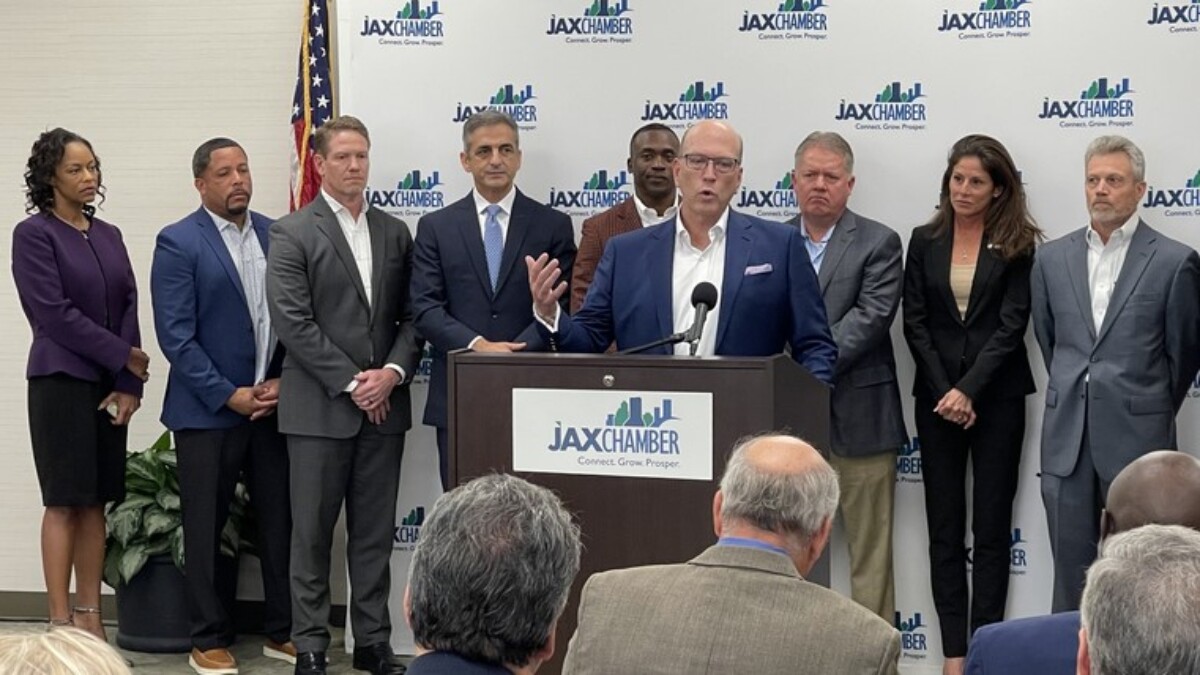A proposed ordinance in Atlantic Beach would restrict where the homeless could sleep or camp out.
Introduced for its first reading before the City Commission on Monday night, the proposal seeks to “lawfully prevent” sleeping or camping in certain public areas to promote sanitation, public health and safety. It would replace existing legislation regarding loitering in or obstructing those unnamed places.
Michaele McAvoy, interim executive director of the Beaches’ only homeless assistance agency, was unaware of the bill until Jacksonville Today contacted her for reaction.
Mission House, at 800 Shetter Ave. in neighboring Jacksonville Beach, currently serves 160 homeless clients in its Crisis Care program with counseling, food and clothing. Her read of the ordinance seems to indicate it would “more or less criminalize homelessness,” instead of seeking solutions like more housing for them. So if this passes, McAvoy expects Mission House will see more people seeking the daytime help it can provide.
“If there are people who are sleeping on the beach who are not already aware of us, when they are made aware that they are not allowed to be sleeping on the beach, they will probably be told about Mission House and that will probably drive a lot of traffic to us,” McAvoy said. “But that is what we are here for. We are the safety net to help meet those basic needs and help people end their homelessness and find stable permanent housing.”
The proposal arose from city officials’ decision to update their ordinance codes regarding sleeping or camping in public spaces or obstructing those areas, according to the bill’s staff review. The reason was to make the ordinance more consistent with recent case law. That included a 2000 11th Circuit Court of Appeals decision that “sleeping out-of-doors is not a fundamental right,” the bill reads.
The bill, submitted by police Chief Victor Gualillo and drafted by the city attorney, is consistent with current case law, it states. The staff report on the proposal says that people using public areas as living spaces can raise concerns.
“(It) represents a best practices approach to protect all citizens in our city while recognizing the need to respect the constructional right of people to travel freely,” the bill’s staff report reads in part. “The new ordinance recognizes the need to have access to support services before those who are in violation of this ordinance are charged with trespassing and respects the need to keep their personal effects secure.”
Gualillo said violators could be arrested under the new law, as they could now, but they must first be warned that they were in violation and asked to leave the area.
A new provision would require the person to be notified of available emergency shelters, and police would assist them with transportation to one of those locations, Gualillo said.
Homeless care in Jacksonville
None of the Beaches communities have homeless shelters, the closest being in downtown Jacksonville: the Sulzbacher Center at 611 E. Adams St.; Trinity Rescue Mission at 622 W. Union St.; and City Rescue Mission at 234 W. State St. Jacksonville Beach’s Mission House is not a shelter but is the only Beaches facility that helps adult homeless.
Gualillo said city officials have met with representatives of the Sulzbacher Center and are compiling a list of services from numerous providers in Jacksonville who could help people needing emergency assistance.
Reading the proposed ordinance, McAvoy points out that as now written, it recognizes “the right of persons to be free from criminal prosecution for conduct that is considered involuntary.” She said it also says that prosecution for homelessness is considered cruel and unusual punishment. Yet it refers to that appeals court decision that says sleeping outside is not a fundamental right, she added.
“Maybe they (Atlantic Beach) will work with the people they are seeing who are sleeping outside to get them into shelters,” she said. “Unfortunately, Mission House is not a shelter, and most of the people that this is geared toward are already our clients.”
Mission House was formed by members and volunteers of Christ Episcopal, Palms Presbyterian, St. Paul’s Catholic and St. Paul’s Episcopal churches. The Beaches area has little affordable housing, so programs to help the homeless get roofs over their heads exist elsewhere in Duval County.
The ordinance, if passed, would “drive people into more hidden areas” like wooded areas in Beaches communities, she said.
“That’s probably maybe a little bit of why this is being rewritten is because of the visibility of people experiencing homelessness on the beach,” McAvoy said. “But when you are in a crisis, you are going to go where your needs can be met, so I would think the shelters may see an uptick as well.”
Due to budgetary issues, McAvoy said Mission House has temporarily reduced capacity in its Crisis Care program. That means Mission House services are available on weekdays, with no weekend service. Meals are served from 10 a.m. to 6 p.m. Mondays and Thursdays and noon to 6 p.m. Tuesdays, Wednesdays and Friday.
Normal procedure for an ordinance proposal like this is that if the commission clears it to move on after the first reading, a second would be done by its members in two weeks. That’s on Nov. 28, when a public hearing would be held, followed by a commission vote, city officials said.
9(MDEwNzczMDA2MDEzNTg3ODA1MTAzZjYxNg004))







